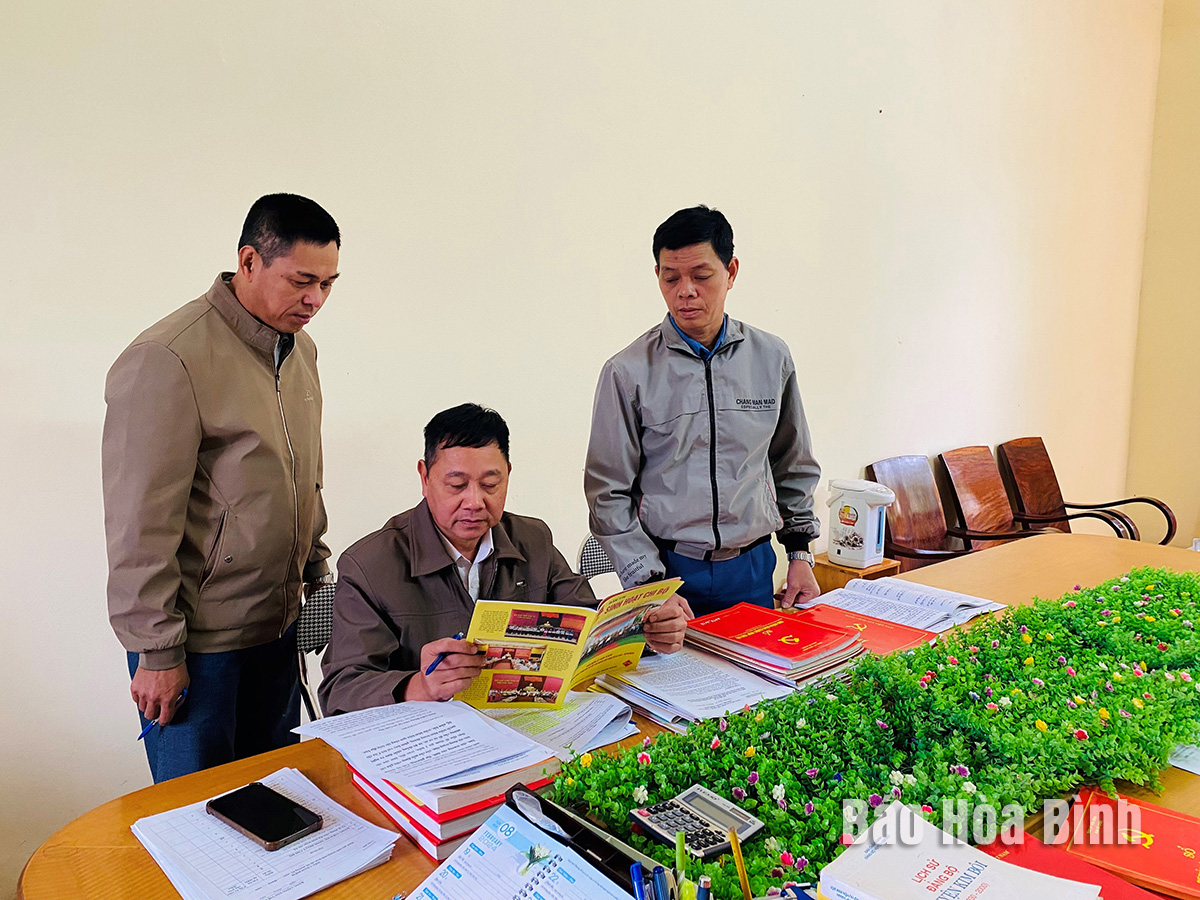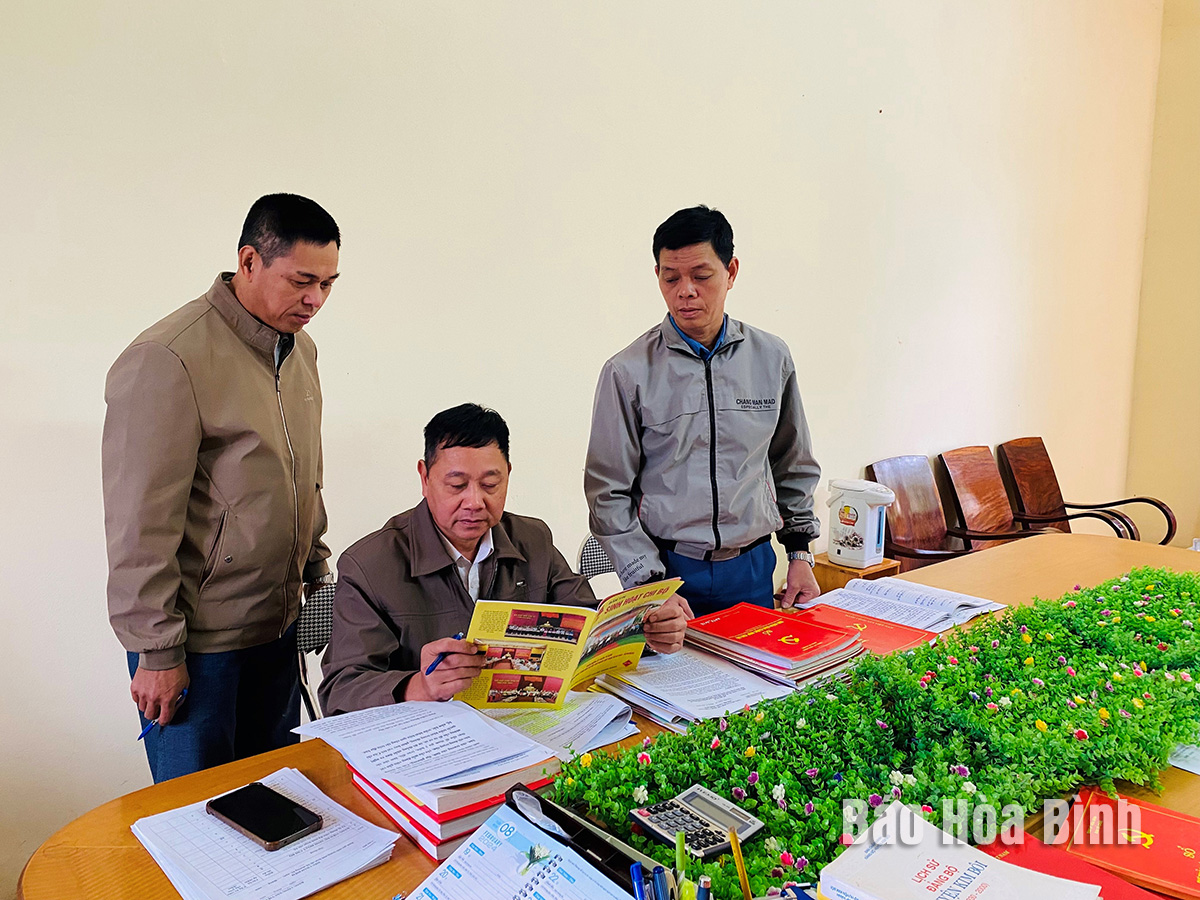
Imbued with President Ho Chi Minh's teaching "The Party cell are the Party’s grassroots foundations. A strong Party cell ensures the effective implementation of the Party’s policies and continuous progress in all tasks," the Party Committee of Kim Boi commune, Kim Boi District, has rolled out the "four-good Party cell" model. The initiative has created a positive change, enhancing the leadership capacity and fighting spirit of Party organisations and their members.
The Party Committee of Boi Cau hamlet, Kim Boi commune in the
district of the same name, discusses preparations for its monthly meeting.
In 2023, the Kim Boi commune Party Committee selected the commune public
security’s Party cell as the pilot for implementing the "Party cell with
four good" model. Accordingly, it must satisfy four key criteria, namely
successfully fulfilling political tasks, maintaining high-quality Party
activities, upholding solidarity and discipline and cultivating exemplary
cadres and Party members.
According to Major Bui Duy Tuyen, head of the commune public security and
Secretary of its Party cell, responsibilities are assigned based on each Party
member’s strengths and designated duties. Those working at the one-stop-shop
are tasked with improving service quality for individuals and organisations in
handling administrative procedures. Meanwhile, Party members responsible for
village security regularly conduct patrols to ensure security and order in the
area, thereby people feel secure in daily lives and production activities.
The Party cell of Boi Cau hamlet also considers high-quality Party activities
essential for improving the leadership capacity of the organisation. To develop
a "four-good Party cell," it has focused on innovating meeting
formats. Besides discussing official documents and local policies, key issues
are highlighted, and Party members are encouraged to share insights based on
real-life experiences. This approach deepens discussions on grassroots issues,
enabling the Party cell to pass resolutions that effectively address local
challenges.
Bui Van Chau, Secretary of the Boi Cau hamlet Party cell, shared that their
cell consists of 39 Party members who hold regular meetings on the 25th of each
month. These meetings are meticulously prepared, with a well-structured agenda,
conclusions, and decisions discussed and approved by the Party Committee before
being presented to their members.
Currently, the Kim Boi communal Party Committee has 596 Party members across 23
Party cells, including 14 in residential areas and 9 in government agencies. To
develop strong grassroots Party organisations in line with Ho Chi Minh’s
ideology, the commune’s Party Committee has focused on innovating Party
activities and improving the quality of resolutions, programmes, and annual
work plans; strengthening leadership teams, including Party secretaries and
executive members; recruiting and developing new Party members; restructuring
and consolidating different types of grassroots Party organisations
Last year, five Party cells were recognised as "successfully fulfilling their
duties," while 18 others were rated as having "fulfilled their duties
well." Among Party members, 93 were classified as "outstanding,"
and 410 as "good performers."
Bui Van Hoan, Permanent Deputy Secretary of the Boi commune Party Committee,
emphasised that building a strong "four-good Party cell" requires
accountability from Party leaders, particularly those in charge of
Party-building efforts within their assigned units. The effectiveness of each
Party organisation’s leadership and operations is a key criterion in assessing
the performance of Party officials.
The successful implementation of the "four-good Party cell" model in
Kim Boi commune has led to positive transformations, laying the foundation for
its expansion across the entire Party Committee. This initiative plays a
crucial role in enhancing the leadership capacity and fighting spirit of
grassroots Party organisations, contributing to the successful realisation of
the commune’s Party Congress Resolution for the 2020–2025 term.
In the spirit of "Party members go first, the people follow”, all households of Party members in the Doan Ket sub-region in Da Bac town, Da Bac district, voluntarily removed gates and fences, and donated land when the road expansion project passed through their properties. Inspired by their example, 68 households in the sub-region quickly followed suit, contributing over 1,400 sq.m of residential and perennial cropland to widen the main road through the residential area. The exemplary role of Party members in Doan Ket stands as a shining example of studying and following President Ho Chi Minh’s thought, morality, and lifestyle.
The Hoa Binh provincial People's Committee held a monthly meeting on May 29 to assess the implementation of socio-economic development tasks in the first six months of 2025, the progress of key projects, and some other important issues.
During his lifetime, President Ho Chi Minh always expressed his deep affection and special concern for children and youth. He once emphasized: "Caring for and educating children well is the responsibility of the entire Party and the entire people”; "First of all, the family (i.e. grandparents, parents, siblings) must do this job well”. "the Party Committees…, the Children’s Committee, the Youth Union, the education sector, and all related organizations must have specific plans to ensure children grow healthier and more progressive”. His teachings has been remaining valuable and serving as the guiding principles in the work of protecting, caring for, and educating children. In line with this ideology, Hoa Binh Province has continuously been prioritizing and investing resources in the well-being of children in recent years.
Mr. Nguyen Phi Long, the alternate Member of the Party Central Committee and Secretary of the Provincial Party Committee chaired the meeting of the Standing Committee of the Provincial Party Committee to provide opinions on several investment projects within the province. There was the attendance of Ms. Bui Thi Minh, the Permanent Deputy Secretary of the Provincial Party Committee and Chairwoman of the Provincial People’s Council; Mr. Bui Đuc Hinh, the Deputy Secretary of the Provincial Party Committee and Chairman of the Provincial People’s Committee and other members of the Standing Committee; the leaders from other departments, agencies, and some localities.
The Standing Board of the Vietnam Fatherland Front (VFF) Committee of Hoa Binh province held a meeting on May 28 to honour outstanding village elders, village heads, and reputable individuals from local ethnic minority and religious communities.
In mid-May, the provincial Museum organised an exhibition named "Duoi la co Dang Cong san Viet Nam quang vinh” (Under the flag of the glorious Communist Party of Vietnam). This meaningful activity took place in the joyful atmosphere to celebrate the country's major holidays and the Party congresses at all levels for the 2025-2030 term, towards the 14th National Party Congress.



